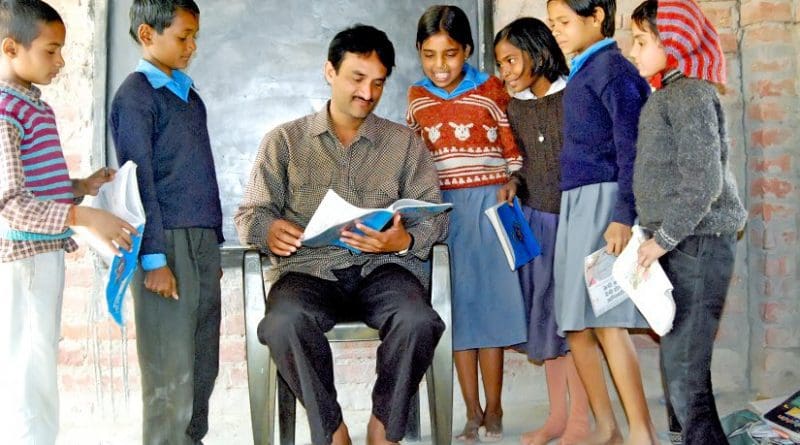Enrolment Sans Quality: A Process To Un-Schooling – OpEd
While almost all the children in India are enrolled in school after the successful implementation of the government flagship programs; Sarva Shiksha Abhiyan and Rastriya Madhyamik Siksha Abhiyan their performance is far below satisfactory levels. The common view for improving low level of performance in school system is adequate infrastructure and recruitment of teachers. But do inputs ensure learning for all? The available data on student achievement suggest low performance of students in many states across India. The students who reach higher standards do not have the fundamental skills of reading or arithmetic. They are unlikely to reach the levels of capability expected of children after primary or secondary years of schooling, as mandated by the Right to Education (RTE) Act. Indian school whether government or private focuses on completing curriculum and do not have a system to provide learning support to children who need it. Even our aware citizens, academicians and policymakers at central, state and local levels fail to solve the issue of low levels of learning. This has led to the serious risk of not gaining from continuing in school.
Issues with schools
The issue in India is not what the children are being taught, but how they are being taught. School in India, firmly resort to rote learning in all the subjects. History with dates and places, English with memorizing poems, Geography with country capitals, Mathematics with no of apples and oranges so on and so forth. Why do we force our students learn the dates of wars, or country capitals or long poems, instead of making it clear to them that why war happened, what could have stopped wars, peculiarity and culture of different countries and interpretation of poems. Scoring more in examination involved writing long answers. Why don’t we have exceptional teachers who can make students fall in love with their subjects?
The answer to this question is that our teachers do not make an effort to clear concepts, they punish students for not completing homework, they give less marks to students who write subjective answers just because answers are not as taught. This is the case for millions of students across India. In the External Board examination students may score above 90 % marks in English or other subjects because of good handwriting and writing exactly what the teacher taught. The concern for what is not taught in school is; how to manage budget, what are taxes, the role of stock exchange, education of girls and boys on sex education or how to develop independent thought among students. It is important for students to learn how to articulate their own opinion while giving speech and writing compositions as well as inculcating many basic skills that adults require to navigate life. Furthermore, improving learning will require attention to many things, including increasing teacher accountability.
The Plight of Students
It is the responsibility of school and teachers to prepare students for higher education. Our students after entering a university cannot write an essay of substance in English and get disappointed with low scores. This is because our teachers fail to substitute independent research and critical analysis skills among students. Sometimes children after entering universities began to realize that more than one answer can exist to most questions and this proves to be the beginning of their un-schooling. But how many of our students get an opportunity to undergo this un-schooling? It is important for the children to come out of the effects of such schooling.
For the parents and educators it is important to do self introspection on how many of our children lose themselves under the process of schooling, in the institutions called school. Where they are expected to excel in areas they have no interest or aptitude and punished when they fall short in teachers self-imposed evaluation scale? How many of our students still fear scolding’s for a spelling mistake or an incomplete answer? How many children fear speaking up they were told they are wrong since it isn’t in the text books? How many children know formulas by heart but fail to solve real life problems? How many children’s innate curiosity and imagination is crushed under the pressure to score more? How many potential writers, painters, social workers and entrepreneurs were sacrificed to amass professional degrees? How many children are made to believe that a government job is the ultimate success they can achieve in life? Teachers and Parents need to give a serious thinking to these questions.
The way forward
The major concern in Indian education is ensuring quality, improving teacher capabilities, effective use of technology and improving management systems. To achieve better learning outcomes India requires to pool both intellectual and economic experience and resources. Though there is a lot of potential in technology to improve education but how to implement it most cost-effectively, still remains a question. Not to mention there are several initiatives undertaken by NGOs, like the Azim Premji Foundation, Educom or Intel in content creation, teacher training and classroom learning but many more such initiatives are required to bring a change in system of education in India.
Therefore lack of learning in schools can be improved with building capacity and upgrading teacher education both in terms of curriculum and pedagogy. But this requires concrete steps by government that would help children to achieve full potential of their capabilities, only this will enable India reach its national goals for growth and equity.

